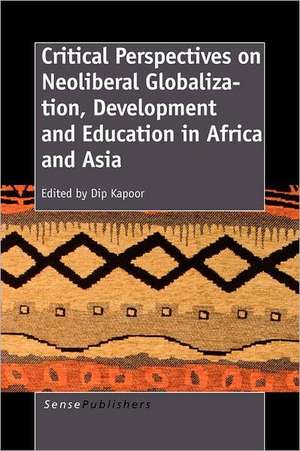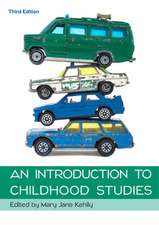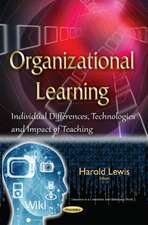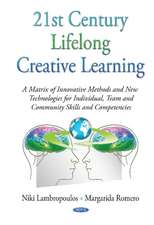Critical Perspectives on Neoliberal Globalization, Development and Education in Africa and Asia
Dip Kapooren Limba Engleză Paperback – 31 dec 2010
| Toate formatele și edițiile | Preț | Express |
|---|---|---|
| Paperback (1) | 245.28 lei 38-44 zile | |
| Brill – 31 dec 2010 | 245.28 lei 38-44 zile | |
| Hardback (1) | 568.45 lei 38-44 zile | |
| Brill – 31 dec 2010 | 568.45 lei 38-44 zile |
Preț: 245.28 lei
Nou
Puncte Express: 368
Preț estimativ în valută:
46.97€ • 47.93$ • 39.52£
46.97€ • 47.93$ • 39.52£
Carte tipărită la comandă
Livrare economică 21-27 februarie
Preluare comenzi: 021 569.72.76
Specificații
ISBN-13: 9789460915598
ISBN-10: 9460915590
Pagini: 236
Dimensiuni: 156 x 234 x 13 mm
Greutate: 0.32 kg
Editura: Brill
Colecția Brill
ISBN-10: 9460915590
Pagini: 236
Dimensiuni: 156 x 234 x 13 mm
Greutate: 0.32 kg
Editura: Brill
Colecția Brill
Recenzii
At last, a remarkable collection of essays written by a range of scholars, mostly originating from Asia and Africa, demonstrating with admirable clarity how policies and practices of neo-liberal globalization in those regions cannot be adequately understood without appreciating how they are a product of the exploitative histories of colonialism. Written with conceptual sophistication, personal knowledge and deep conviction, these essays represent a major scholarly intervention in contemporary debates about globalization and education. ??Fazal Rizvi, Professor, Graduate School of Education, University of Melbourne, Australia & Professor-Emeritus, University of Illinois at Urbana-Champaign, USA.
This intriguing and provocative volume deals with crucial intersections between global forces and national initiatives with respect to the most crucial agency of transformation: education. The cumulative efforts of this assembly of committed intellectuals reveal the forces that retard progress in the two largest continents and offers compelling suggestions on how to redefine the boundaries of power, the contents of knowledge, and the use of critical thinking to create alternative spaces of autonomy, freedom, liberation and empowerment. Toyin Falola, University Distinguished Professor & Frances Higginbotham Nalle Centennial Professor, University of Texas at Austin.
This volume, well crafted by Dip Kapoor, one of the finest scholars in the postcolonial education field, brings together writers who examine processes of learning and education more broadly within the context of the dominant discourses of globalisation and 'development’. They unveil the underlying neocolonial, neoliberal tenets of these processes strongly echoing what Hardt and Negri would call 'Empire.’ In short, another important reading resource provided by Dip Kapoor and colleagues. Peter Mayo, Professor & Chair, Educational Studies, University of Malta.
Finally, a much awaited intervention on neoliberal globalization from Asian and African perspectives! This book makes a compelling case for a historically grounded, regionally specific analysis of globalization. The contributions are extraordinary for their textured and embedded analysis of neoliberal globalization. One of those rare books that deserve to be read across the social sciences. Sangeeta Kamat, Associate Professor, International Education, University of Massachusetts, Amherst, USA.
This intriguing and provocative volume deals with crucial intersections between global forces and national initiatives with respect to the most crucial agency of transformation: education. The cumulative efforts of this assembly of committed intellectuals reveal the forces that retard progress in the two largest continents and offers compelling suggestions on how to redefine the boundaries of power, the contents of knowledge, and the use of critical thinking to create alternative spaces of autonomy, freedom, liberation and empowerment. Toyin Falola, University Distinguished Professor & Frances Higginbotham Nalle Centennial Professor, University of Texas at Austin.
This volume, well crafted by Dip Kapoor, one of the finest scholars in the postcolonial education field, brings together writers who examine processes of learning and education more broadly within the context of the dominant discourses of globalisation and 'development’. They unveil the underlying neocolonial, neoliberal tenets of these processes strongly echoing what Hardt and Negri would call 'Empire.’ In short, another important reading resource provided by Dip Kapoor and colleagues. Peter Mayo, Professor & Chair, Educational Studies, University of Malta.
Finally, a much awaited intervention on neoliberal globalization from Asian and African perspectives! This book makes a compelling case for a historically grounded, regionally specific analysis of globalization. The contributions are extraordinary for their textured and embedded analysis of neoliberal globalization. One of those rare books that deserve to be read across the social sciences. Sangeeta Kamat, Associate Professor, International Education, University of Massachusetts, Amherst, USA.















